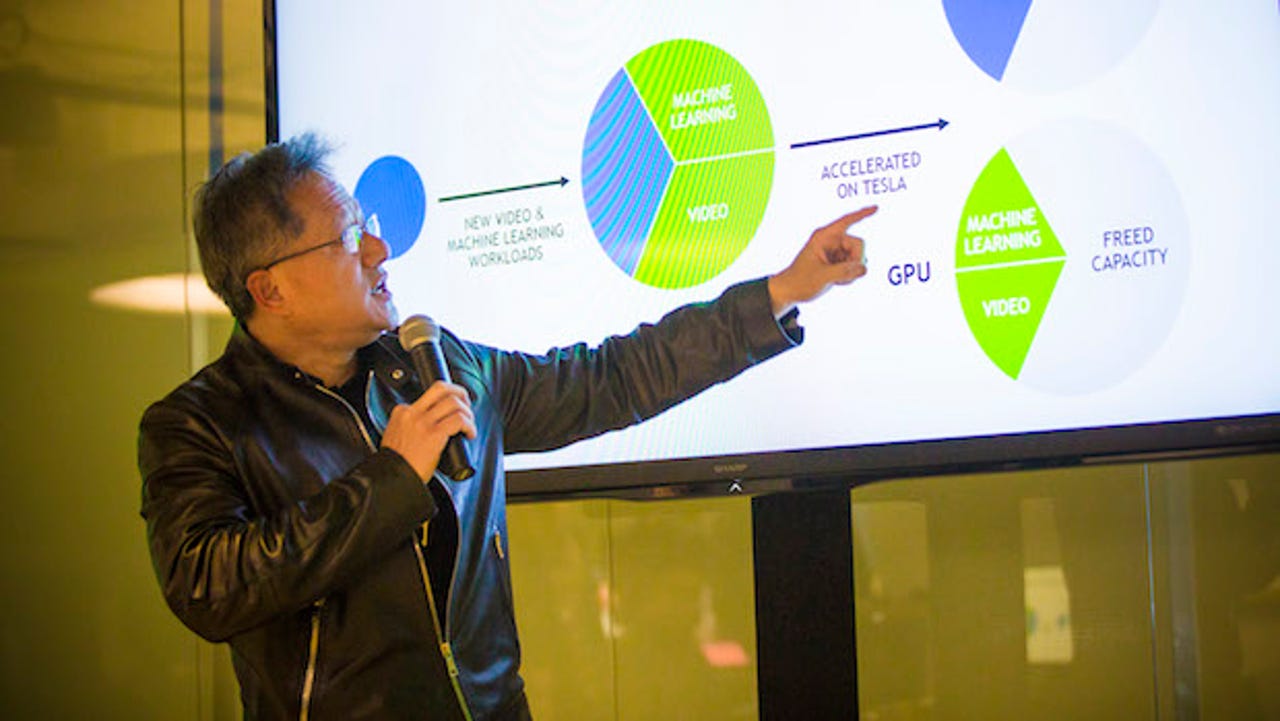Nvidia looks toward AI-powered future with Jetson TX1 debut


SAN FRANCISCO---Rosie, the robotic housekeeper in the iconic cartoon The Jetsons, was often more lifelike in personality than mechanized.
Recent developments in machine learning and artificial intelligence are making such concepts rooted in fantasy and science fiction more tangible than ever.
Perhaps it is appropriate that Nvidia's latest piece of machine learning hardware is dubbed Jetson TX1, which the graphics card maker boasted will power millions of new smart devices to come.
"Machine learning is revolutionizing web services," asserted Nvidia CEO Jen-Hsun Huang, during a media presentation on Tuesday afternoon.
Huang clarified web services is not the only space being propelled forward by machine learning, arguing numerous industries are poised for transformation, such as the automotive industry with self-driving cars.
Jetson TX1 is described to be the size of a credit card, employing deep learning techniques to enable more smart -- and eventually, autonomous -- devices.
The supercomputer module is touted as a plug-and-play operations, requiring under 10 watts of power in order to fuel a teraflop of performance.
Suggested machines Nvidia has in mind for Jetson TX1 include smart surveillance drones monitoring crowds for suspicious activity and robots that act like personal chauffeurs, recognizing its owners habits and needs through natural language, navigation and behavior recognition.
Huang repeatedly stressed machine learning is fostering what he characterized as the most exciting time in computing yet.
"There is little doubt we all need smarter machines to make our lives better," insisted Deepu Talla, vice president and general manager of Nvidia's Tegra chip group.
However, there is still a long way to go, Talla admitted, explaining how the intelligence technology, from localization and mapping to body language analysis, is very much a work in progress.
Most solutions in today's drones aren't doing much processing on their own, Talla noted in explaining the necessity for complicated algorithms -- or machine learning -- for making such drones smarter.
Earlier on Tuesday, Nvidia unveiled a new end-to-end hyperscale data center platform built especially for deep learning.
"Just as the human brain is constantly learning, data centers of the future will be very much the same way," Huang posited, predicting there will always be some servers and neurons dedicated to constantly learning new information.
Nvidia has two accelerator options on the table for these tasks: the higher-end Tesla M40 GPU for deploying deep neural networks and the lower-power M4, a smaller form-factor crafted for machine learning but also routine streaming image and video processing.
The tech giant is also putting together a suite of tools curated for developers and data center managers, most of which rely on GPU-powered technologies for processing, resizing and transcoding images and video.
This spring, Nvidia unveiled several new technologies for advancing deep learning amid the GPU Technology Conference.
Following up the Titan X platform for mobile gaming, the Pascal GPU series arrived with the promise to speed up deep learning applications tenfold compared to Nvidia's previous Maxwell processors.
In August, Nvidia bolstered its Grid platform for virtual desktops and applications with the debut of version 2.0, promising both the delivery of the most graphics-intensive apps ever as well as double both the performance and user density than its predecessor, now allowing up 128 users per server.
The Tesla M40 GPU accelerator and Hyperscale Suite software are scheduled to roll out before the end of 2015 while the M4 GPU is pegged to ship during the first quarter of 2016.
A developer kit for Jetson will be made available for pre-order later this week on November 12, starting at $599 in the United States. It will ship starting November 16. Availability in additional markets is promised to follow within the next few weeks.
An end-production version of the Jetson module is promised to ship worldwide in early 2016 for $299 when ordered in quantities of 1,000 or more.